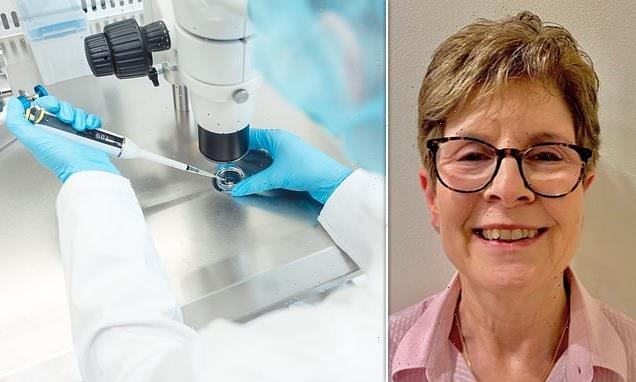IVF clinics selling ineffective ‘add-on’ treatments to ‘desperate’ parents face fines under proposed shake-up of UK fertility laws that could make it easier for same-sex, trans and single people to access services
- Useless add-ons cost couples thousands to up their chances for as little as 1%
- Chairwoman of the UK’s fertility regulator Julia Chain is seeking changes in law
- Clinics misleading patients only get a ‘slap on the wrist’ under 1990 legislation
Julia Chain, pictured, the new chairwoman of the UK’s fertility regulator, Human Fertilisation and Embryology Authority is seeking some fundamental changes in the 1990 laws that govern the fertility sector
IVF clinics that sell useless ‘add-ons’ costing couples to waste thousands of pounds are now to face fines in a shake up of old and outdated fertility treatment laws.
As part of the biggest fertility laws shake-up in 30 years, Julia Chain, the new chairwoman of the UK’s fertility regulator, Human Fertilisation and Embryology Authority (HFEA), is seeking some fundamental changes.
Ms Chain wants to secure powers for the regulator to be able to fine clinics misleading patients and also make it easier for same-sex couples, transgender couples, or single people to access fertility treatment.
The 1990 laws that govern the fertility sector means that HFEA can only give clinics a ‘slap on the wrist’, but Ms Chain, who took over in April, says they need ‘end-to-end powers’ to stop some of the worst offenders.
These add-on procedures can cost hundreds or even thousands of pounds each.
They include ‘assisted hatching’ which sees an egg’s outer layer pierced to ‘help the embryo emerge’, and it costs in the region of £550.
Like most of these add-ons, it has not been shown to increase success rates.
‘Pre-implantation genetic testing’ is supposed to detect abnormal embryos and has a price tag of up to £3,000, but once again has no evidence of reducing the chance of a miscarriage.
In an interview with the Sunday Times, Ms Chain said she will announce her plans for securing more powers for the regulator at the Progress Educational Trust conference on Wednesday.
She explained that patients coming to IVF clinics are often vulnerable and ‘often desperate’ and will do anything to improve their chances of starting a family, including paying thousands for unproven treatments that could up their chances by as little as 1%.
The 1990 laws that govern the fertility sector means that HFEA can only give clinics a ‘slap on the wrist’ (file photo)
She said: ‘What we are looking to do is regulate the way clinics provide information, to make sure that vulnerable patients are not taken advantage of.
‘We want enforcement powers that allow us to have appropriate powers like economic sanctions and fines.
‘We need end-to-end powers ourselves.
‘The act focuses on protecting the embryo, but it is silent on protecting patients,’ she said. ‘It also refers to a family as a man and a woman, preferably married.
‘We have moved on.’
Sections of the 1990 act prove to work against same-sex couples, who require extra medical screening, which also drives up their IVF treatment costs.
It defines a mother as ‘the woman who is carrying or has carried a child as a result of the placing in her of an embryo or of sperm and eggs’.
This can prove problematic for two women wishing to both be considered as legal mothers, and similarly with two men wanting a baby via a surrogate, the legal parent is the woman carrying the baby until a judge rules otherwise.
She continued: ‘We absolutely need to look at this as a priority because it was drafted at a time when people had different ideas about what constituted a family,’
‘Science has completely outstripped the act.’
Ms Chain also wants to change the rules to help allow scientists to use embryos for research beyond the 14-day limit.
Patients coming to IVF clinics are often vulnerable and ‘often desperate’ and will do anything to improve their chances of starting a family (file image)
It was not possible to keep embryos viable for more than a few days in 1990, but the two-week limit was selected in case the embryo had started to feel pain by that point.
Scientists now know the nervous system does not start growing until several days later.
Director at charity Progress Educational Trust, Sarah Norcross, director of the Progress Educational Trust said: ‘The law and regulation that govern fertility treatment and related research are showing their age.
‘Views of what constitutes a family have changed, and non-traditional families deserve to be better served.’
IVF extras: What are they?
For some treatment add-ons, there is not enough evidence to show that they are effective at improving the chances of having a baby for most fertility patients.
These additional treatments can also be referred to as ‘supplementary’, ‘adjuvants’ or ’embryology treatments’.
They often claim to be effective at improving the chances of having a baby but the evidence to support this for most fertility patients is often missing or not very reliable, and can cost couples hundreds or thousands of pounds each.
- Artificial egg activation calcium ionophore
- Assisted hatching
- Elective freeze all cycles
- Endometrial scratching
- Hyaluronate enriched medium (e.g. EmbryoGlue)
- Immunological tests and treatments for fertility
- Intracytoplasmic morphologic sperm injection (IMSI)
- Intrauterine culture
- Physiological intracytoplasmic morphologic sperm injection (PICSI)
- Pre-implantation genetic testing for aneuploidy (PGT-A)
- Time-lapse imaging
Source: Read Full Article



